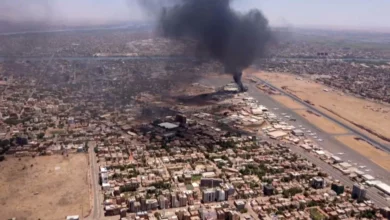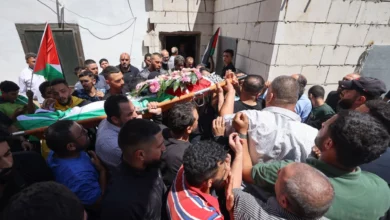
Today's papers, like yesterday's, make an industry out of the political polarization between the Muslim Brotherhood and their opposition. With the violence raging in the streets, papers have been doing more than just reporting about it.
The Brotherhood’s mouthpiece, Freedom and Justice, runs a headline that reads “a full crime.” Inside, its coverage of the violence that raged in front of the Ettehadiya presidential palace focuses on “attempts to invade the palace” and mentions reports accusing opposition leader Mohamed ElBaradei of plotting the events. The story dedicates its second paragraph to describing injuries in the ranks of policemen.
The story also references the case of the man who was seen in a video being dragged, stripped naked and beaten up by police. Sounding like someone who has been heard during a hide-and-seek game, the paper says, “In a [huge] surprise to everyone, [the man] denied to the prosecutor that it was policemen who stripped him naked." We are left to wonder what happened, which the paper still cares to clarify toward the end of its story by quoting a journalist for the state-run Radio Misr who was at Ettehadiya and allegedly witnessed the event. The journalist says, “To be fair, the man is the one who actually stripped himself naked.” On a February night. During a cold wave.
After Ettehadiya, the paper dedicates a two-page focus file on the Salvation Day protests, organized by the Brotherhood’s opposition on Friday. Its headline reads “the failure of the Friday of Destruction,” and it covers the weakness of the mobilization, people’s discontent with continuing chaos and other accusations formerly made against the Brothers themselves when they were on the other side of the contentious political scene. The paper goes as far as describing the persistent sexual assaults in Tahrir as a result of the opposition National Salvation Front’s failure to secure protests.
Further playing the smear campaign against the National Salvation Front, Freedom and Justice runs a full page interview with Ayman Nour, the head of Ghad al-Thawra Party, known as the friendly opposition member who never declines a call for dialogue and camaraderie from the presidency in order to secure a place among the tolerated opposition. Nour tells the paper that the current protests are intended to spread chaos, and also says that he won’t continue working with the Front because of its “exclusivist politics” and “unacceptable” statements.
Taking the other extreme, the liberal Wafd Party’s daily runs a colossal red headline on its front page that reads “shame” laid over a screenshot from the video of a man being dragged naked by policemen near Ettehadiya Palace.
The paper features the man’s family, who stands by the story that the policemen were the ones who abused him, although the man has reportedly denied the account under pressure. In an interview with his daughter, she says that she went with him to the presidential palace to protest against oppression and that she saw him being dragged by policemen with her own eyes. His aunt is quoted as saying, “may God reprimand the government and the Brothers.”
On the same page, a headline reads, “a new crime to be added to the security forces and regime’s registry.” The story’s lead, sounding more like an op-ed, compared the incident to the stripping and beating of a female protester during the Cabinet protests in 2011, saying, “There is no human dignity, or freedom, after the revolution that called for bread, freedom and human dignity.”
The paper also focuses on injuries and deaths among protesters over the last few days, while also portraying an image of widespread wrath against President Mohamed Morsy in the governorates, particularly in the Suez Canal area. “Ismailia holds Morsy responsible for the massacres” reads one headline, with another being “disillusioned by the politics of the Brothers, the activists of Port Said call for independence.”
Oddly enough, the official state print media pales next to this polarization. Al-Ahram, in a very practical headline that evades violations and condemnations, says, "Ettihadeya and Tahrir are cleaned of the clashes’ traces." The paper focuses on the view from the Interior Ministry’s windows, quoting the minister as saying, "If the security apparatus fails, Egypt will turn into militias."
Slightly more insightful in its content is the privately-owned Al-Shorouk, which runs a story on its sixth page holding all political stakeholders responsible for the escalation over the last few days. "The blood of Ettehadiya’s victims is lost between the National Salvation Front and the presidency." The story describes the rush to clean up the site of the clashes near the palace, including the scattered blood spots, while political leaders continue to fight on newspaper pages and television screens. In the process, accountability becomes a casualty.
But it also doesn't keep from us some relics of the eventual banality of the state. In a side bar, we read a story about a tailor arrested in the North Sinai city of Arish for making black masks and selling them to protesters, most notably, the infamous Black Bloc.
Egypt’s papers:
Al-Ahram: Daily, state-run, largest distribution in Egypt
Al-Akhbar: Daily, state-run, second to Al-Ahram in institutional size
Al-Gomhurriya: Daily, state-run
Rose al-Youssef: Daily, state-run
Al-Dostour: Daily, privately owned
Al-Shorouk: Daily, privately owned
Al-Watan: Daily, privately owned
Al-Wafd: Daily, published by the liberal Wafd Party
Youm7: Daily, privately owned
Al-Tahrir: Daily, privately owned
Al-Sabah: Daily, privately owned
Freedom and Justice: Daily, published by the Muslim Brotherhood's Freedom and Justice Party
Sawt al-Umma: Weekly, privately owned
Al-Arabi: Weekly, published by the Nasserist Party
Al-Nour: Official paper of the Salafi Nour Party




